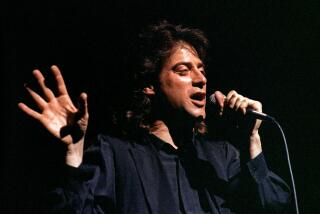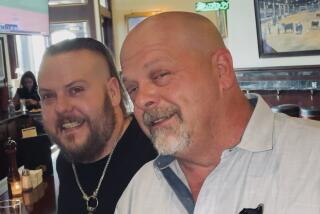Two of Life’s Lessons From Rex Harrison
- Share via
At my age, the death of any public figure is certain to stir memories, but the departure of Rex Harrison was especially evocative. Harrison--more or less inadvertently--taught me two lessons that have been of enormous help to me through much of my life.
I chose to quit a well-paying, full-time job to turn to the fragile livelihood of free-lance writing the same year (1956) that “My Fair Lady” opened on Broadway. Although I had the full support of my family, it was a difficult year financially. What had been extra money from magazine writing when I was earning a salary proved both elusive and inadequate when it became my only source of income, and we were struggling rather badly.
Then a New York friend for whom I had once done a favor phoned to tell me that he had two fourth-row seats for “My Fair Lady” if I could get to New York to use them. Only those of you who were tuned into theater more than three decades ago could understand the enormity of that offer. It was rather like Michael Crawford’s last week in “The Phantom of the Opera.”
“Fair Lady” tickets were being scalped for ridiculous prices, and the show was sold out for many months ahead, especially after rumors started that Harrison might be leaving it.
I don’t think I ever wanted anything more in my life than to see the original cast in “Fair Lady,” yet it seemed absurd in our circumstances. We lived in Chicago, and air tickets, hotel and a sitter for our children would just about wipe out all of our financial reserve. But I pushed hard, and we went--and there has never been a moment of regret since. The ability to conjure up Harrison, only a few feet away, standing on his doorstep singing “I’ve Grown Accustomed to Her Face” is instant and total. And priceless.
About eight years later, I crossed paths with Harrison again. We were living in California then, and I was doing a lot of writing about the movie business for national magazines. Harrison was in Hollywood doing the film of “My Fair Lady,” and I was assigned to interview him. He had requested that no interviews be done until the film was completed, and so arrangements were made for me to see him on wrap day.
When I arrived at the studio, a nervous publicist told me that Harrison had been up late the night before at a cast party and was tired, irascible and anxious to get away. As if that weren’t bad enough, I had been preceded by a young woman interviewer for a national TV news show. She had come in ill-prepared and was asking Harrison dull and mundane questions while the TV cameras rolled. This irritated Harrison to the point where he was giving monosyllabic answers, and the whole interview was collapsing like a punctured ego.
At one point, the publicist came out and said to me grimly, “You’d better engage him fast or you’re not going to get anything.”
It was a difficult monkey to carry on my back while I was waiting, but I chose to take the warning seriously. So I did a lot of thinking.
Then the door burst open and the TV people emerged. The interviewer was red of face and clearly agitated. I could see Harrison through the door, feet planted in a typical Henry Higgins stance, scowling after the retreating crew. Not a hopeful picture.
He continued to stand as I was introduced to him, barely acknowledging the introduction. He made no move to offer me a chair or to sit down himself. His whole mien said, “Let’s get this over with fast”--which meant I would go away empty-handed since I had been promised significant time with him.
So I avoided any small talk and any recognition of the scene that had just been played out and asked him: “Did you know George Bernard Shaw?”
That stopped him briefly, and he allowed that yes, he did. Not well, but he had met and talked with Shaw several times and was, of course, quite familiar with his work.
Then I asked: “Would Shaw have approved of the ending of ‘My Fair Lady?’ ”
It worked. Harrison looked at me for a few seconds, then sat down and waved me to a chair. He was impatient, irreverent, opinionated and arrogant. But he was also funny and warm and sometimes self-deprecating. And before we were through, I told him the story of my trip to New York to see “Fair Lady.”
So what are the lessons I learned from Rex Harrison?
First, and most significant, not to let things that are terribly important to you pass you by in life for the wrong reasons. And I suppose the corollary of this is to take chances once in a while, when the stakes outweigh the risk. And maybe even sometimes when you aren’t sure.
The memory of that show is a nugget of warmth and beauty that will be stored in the vault of my memory until I die, to be brought out and enjoyed at will. I’m perfectly aware of the danger of this kind of thinking: that attaching excessive importance to too many things is an indulgence that can, indeed, be counterproductive. But we know the difference. We know when the Fair Ladies come along--and we should dance with them. All night.
The lesson I learned from the interview is simply that a professional who isn’t prepared deserves to be humiliated. And I suspect that applies to a lot of other fields besides journalism. Whenever I contemplate short-cutting my own preparations, I remember the face of that reporter emerging from Rex Harrison’s dressing room--and I do my homework.
So thank you Rex Harrison--for pleasure given and lessons learned. And don’t be too impatient with the natives, wherever you are.
More to Read
Only good movies
Get the Indie Focus newsletter, Mark Olsen's weekly guide to the world of cinema.
You may occasionally receive promotional content from the Los Angeles Times.










